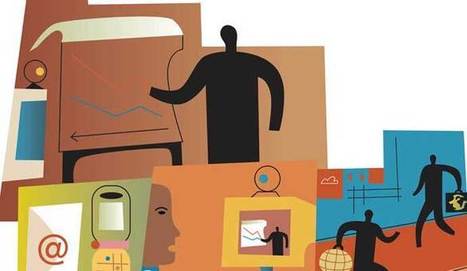 Your new post is loading...
 Your new post is loading...
You've heard the stories, read the reports, and know the trends. It's undeniable that how we work is changing dramatically and that most companies need to reconsider their current strategies to set themselves up for future success. So why isn't your company changing? It could be the cost or time involved, or perhaps the manpower to lead such a charge. But in those cases, the benefits easily outweigh the costs. Most often, the biggest barrier to change comes down to a mental roadblock. We've been taught to do things a certain way for so long, it can seem counterintuitive to change.
Via The Learning Factor
I'm sure you've been asked many times whether you're an introvert or an extrovert. For some people, it's an easy choice, but for most of us, it's difficult to choose one way or the other. It's hard to choose because the introvert/extrovert dichotomy reflects a tired and outdated view of personality. Personality traits exist along a continuum, and the vast majority of us aren't introverts or extroverts-we fall somewhere in the middle. Personality consists of a stable set of preferences and tendencies through which we approach the world. Personality traits form at an early age and are fixed by early adulthood. Many important things about you change over the course of your lifetime, but your personality isn't one of them.
Via The Learning Factor
Every supplier knows the drill: You identify your most valuable customers and classify them as “strategic accounts.” You can’t afford to lose them. Whatever they ask for, you deliver with your best team and best turnaround — even if it’s unreasonable or unprofitable. The customers know they are a strategic account, so they’ll try everything to wring out cost savings. Even customers that use extensive analysis and a rigorous qualification process to identify the ideal vendor have learned that discounts will flow if they put a supplier through the procurement price “buzz saw.” It’s a brutal process. No wonder a recent study showed that salespeople worry more about the price conversation than any other part of the sales cycle.
Via The Learning Factor
The eight-hour workday WDAY -0.71% is an outdated and ineffective approach to work. If you want to be as productive as possible, you need to let go of this relic and find a new approach. The eight-hour workday was created during the industrial revolution as an effort to cut down on the number of hours of manual labor that workers were forced to endure on the factory floor. This breakthrough was a more humane approach to work 200 years ago, yet it possesses little relevance for us today. Like our ancestors, we’re expected to put in eight-hour days, working in long, continuous blocks of time, with few or no breaks. Heck, most people even work right through their lunch hour!
Via The Learning Factor
I have never heard of anyone who has had a bad customer experience with Amazon, Apple, Costco, or Salesforce. The aforementioned companies are incredibly successful due, in large part, to a material focus on the customer experience. Not surprisingly, the stock market has handsomely rewarded these four companies over the past decade. Amazon is so customer focused that it will literally send you a replacement for a lost package immediately without ever implying that the customer is at fault. The result is a consumer experience that is so optimal that Amazon is the only place where many consumers decide to shop online. The same can be said for Apple when it comes to the in-store experience. Apple employees are so passionate about the products that I feel like I am talking to a polite tech enthusiast in the Apple stores and not Apple employees. The result is incredibly brand-loyal customers.
Via The Learning Factor
At VaynerMedia, we like to say, "Family first, agency second." Your employees are important, because it is their skills that keep your machine running. I started VaynerMedia in 2009 with my brother, AJ; a handful of his closest friends became our earliest employees. Having taken two businesses from $3 million to $60 million in revenue, each in less than five years, I've learned that employee happiness and well-being come before everything else--including signing on new clients. This emphasis has allowed me to scale up the businesses and build committed teams as we continue to innovate. But as much as you care for them, don't expect your staff to be as committed to your business as you are. Too many entrepreneurs complain that staff members don't work as hard as they do. It's a ludicrous expectation: Why should they be concerned about a business that's not theirs?
Via The Learning Factor
The meek might be on track to inherit the earth but they're a ways off from inheriting a position at the head of the conference room table. Meek is simply not an adjective that is generally thought of when you think of someone commanding leadership, as I discussed in a post on the 9 tactics leaders use to command a room. Power, poise, and purpose, yes. Presence? Yes! Growing up in a large firm with a strong sense of history and culture, I heard a lot about executive presence--what it was, who had it, and what any aspiring leader would need to do to get it. Here's what I found.
Via The Learning Factor
Business leaders sometimes make the assumption that if they have succeeded as a leader in one field of battle that they can simply replicate that strategy across all types of teams. That isn't necessarily true. Leadership is contextual and a skill that must be constantly developed and adapted. I have succeeded and failed in leadership positions throughout my life and therefor learned much throughout the journey. If we can apply just some of the lessons learned then we can usually find ourselves in a constant state of improvement. Most people have the opportunity to be a leader many times during their life. Whether that is as an entrepreneur, business executive, board member of a charity, coach of their kid's sports team, or as a leader of the family. The list goes on and on. Each opportunity comes with its own set of challenges.
Via The Learning Factor
Closing deals comes at a cost to the salesperson: the opportunity cost of closing more deals in the same amount of time. As a salesperson, every call you have should be calculated, and every dialogue should have a meaningful and pre-planned goal. The good news is that there are often easy things you can do to make deals come in more quickly, without jeopardizing the business relationship. 1. Disqualify Early As much as you want to close deals, don't be afraid to disqualify prospects who you think won't buy. Your time is valuable, and you should spend it with prospects that you have a realistic chance of closing. Before you book an hour-long call, make sure that the prospect understands entirely what the call will be in regards to, and make sure that they are in a position where you can both gain from the call.
Via The Learning Factor
In 2012 a curious person on the web—likely an enthusiastic entrepreneur—asked a simple question on Quora: Does a startup need an HR person? This was in the infancy of the current boom—or bust—we’re now in; Now-defunct shopping website Fab had just raised $117 million; Pinterest landed $100 million, Box raised $125 million, and Square got $200 million. Startups at the time were figuring out how to ride this wave, so it’s unsurprising that the first and most popular answer provided was this: "No, you don’t need an HR person." Things have changed since then. For one, many believe the startup boom may be coming to an end, what with the rate of venture funding—along with many valuations—ramping downward. Startups are also being forced to grapple with their internal cultural problems; big companies like Twitter, Google, and Apple are being asked to divulge their internal demographics thanks to widespread calls for a more open and transparent work culture. But even with an insular industry seeing slightly more public dialog about its intrinsic biases and inequalities, startups still have difficulty figuring out how to maintain and cultivate their workforce. And this aversion to HR may explain some part of that.
Via The Learning Factor
You’ve entered a world of perpetually unfinished business. Meetings end without resolution; discussions start and then stop without clear next steps; work is plagued by mistakes; miscommunications need to be clarified; and issues weigh on your mind because they are always partially addressed, but never fully resolved. This pattern can convert even the most talented individual leader into a mediocre performer who stays busy, but not productive. To address your manager’s dilemma: Hone in on your distinctive contribution and be selective with the projects and priorities you accept. How you approach this subtle challenge has a great impact on your performance. You cannot make progress on the priorities that matter by changing superficial behaviors — for instance, by keeping to-do lists or sorting your email differently.
Via The Learning Factor
And then there was Bill Campbell, who died of cancer on Monday at 75. He was one of the most influential figures in Silicon Valley, yet was outside the norm in just about every way. Even though he was CEO of Intuit and was chairman of its board until his death, "Coach," as everyone called him, could not write a line of code. He grew up in the Rust Belt of Pennsylvania and attended Columbia only because his father knew the football coach there and he wanted to play. He got a degree in education and headed into a career as a college football coach. But somewhere along the way he took a left turn and wound up at Apple (where, among other things, he kept the company from chickening out and canceling its famous "1984" Super Bowl ad). His death is a sad, sad loss. But we can all still benefit from his wisdom. 1. Care about people more than anything
Via The Learning Factor
Over the years, Goldstein has learned some important lessons about how to create an environment where innovation thrives. Here are seven essentials. Be A Sponge Innovators are intellectually curious and thrive on absorbing new information that may help their ideas. The I-lab holds regular programming and has a mentoring program to help innovators learn as much as they want to learn. Even if you don’t have the benefit of the I-lab, continually seeking out the information you need and people who can teach you essential skills and information is an important part of being innovative, she says. o edit the content
Via The Learning Factor
|
Let’s be honest: One of the perks of working from home is that you can do it in your pajamas. The term "dress for success" need not apply when you can roll out of bed and be on duty in a minute or less. Whether you’re a yoga-pant-wearing independent contractor like me, or you telecommute or own a home-based business, Donovan says there are six reasons why you should dress up in workplace attire. 1. You Maintain A Professional Perception If you are part of a team and participate in video meetings, it’s important to dress the part, says Donovan.
Via The Learning Factor
Learn about your industry and get caught up with current trends. First things first, you need to do a little homework about your specific industry. Review some back copies of trade magazines and articles from industry leaders and influencers. Going over these articles and editorials can help you catch up to speed and see what's currently being discussed, as well as help you form your own opinion. Personally, websites like PYMNTS.com and Tom Noyes' Star Point blog have both been incredible assets for me. Without sources like those, I wouldn't have obtained as much as information as I have, along with being updates on the latest payments trends.
Via The Learning Factor
Music is regarded as one of the triumphs of human creativity. But does music itself help one to create? It's a question worth asking, since music has increasingly become a part of the modern-day workplace. Music has a strange temporal permanence; as art decorates space, so does music decorate time. With so much of our time being spent at work, and so much of our work being done at computers, music has become inseparable from our day-to-day tasks--a way to "optimize the boring" while looking at screens. To better understand music and productivity, let's look at the research.
Via The Learning Factor
Your work isn't always going to run smoothly, and passive-aggressiveness won't change that. Instead of simmering in silence or working behind the scenes to get even, asserting yourself can actually make things better. The reason many of us don't respond to obstacles in the workplace this way, though, is because we often see assertion as an individual thing—something we do for our own benefit, like asking for a raise or promotion, or defending our ideas in a meeting. But you can use the same tactics on behalf of your team to resolve challenges facing all of you, boost morale, and help get everyone remotivated.
Via The Learning Factor
It's a problem that hits all of us. We all like to think of ourselves as fantastic bosses: authoritative, decisive, inspiring, and respected. But we really can't know how the people we manage actually see us. In fact, a survey of 1,214 leaders by the Hay Group found that the more senior a manager is in an organization, the more the person tends to overrate him- or herself. The survey that the group uses to assess managers is based on work by Harvard researchers George Litwin and Robert Stringer. The psychologists identified what they saw as the six most effective styles of leadership: 1. Coercive Gains immediate compliance from employees. Bosses with this style give orders and take no refusals.
Via The Learning Factor
Mentorship is invaluable. When I first started working as a young professional, I was fortunate enough to have mentors who told me directly when I was making a mistake or when I could be challenging myself more. My mentors were the reason I took a risk to launch a startup, the reason I pursued an MBA, and why I felt confident that I could lead a startup at a young age. At the end of the day, I know I have someone to reach out to when my wisdom and experience runs out and I’m at risk of making a decision that may cause my team or startup undue harm. Mentors help guide you to success and here are four ways to move forward in getting a mentor that is a good fit for you and for your career goals:
Via The Learning Factor
We can't be the alpha dog all of the time. Whatever our personality, most of us experience varying degrees of feeling in charge. Some situations take us down a notch while others build us up. New research shows that it's possible to control those feelings a bit more, to be able to summon an extra surge of power and sense of well-being when it's needed: for example, during a job interview or for a key presentation to a group of skeptical customers. "Our research has broad implications for people who suffer from feelings of powerlessness and low self-esteem due to their hierarchical rank or lack of resources," says HBS assistant professor Amy J.C. Cuddy, one of the researchers on the study.
Via The Learning Factor
Justifying a poor decision as you continue to head down the wrong path, or rationalizing the bad choice you know you're about to make, might feel better in the moment. But in the long run, excusing your bad decisions only robs you of mental strength. Everyone overlooks risk, gives in to immediate gratification, or behaves impulsively at one time or another. But to really grow stronger, you have to acknowledge your mistakes so you can change your behavior going forward. Here are four phrases mentally strong people don't use to justify their behavior:
Via The Learning Factor
We’ve all been there — accidentally alienated a new coworker with a bad joke, underwhelmed the new boss by botching our first assignment, or had a client we didn’t just click with. The trouble is that initial impressions are hard to shake. In a psychological phenomenon known as the “fundamental attribution error,” humans are quick to “essentialize” the behaviors of others. You might have simply been having a bad day, or you might have been off your game because of a recent breakup or death in the family, but your new colleague isn’t likely to extend that generous of an explanation. Instead, they’re far more likely to assume that your subpar performance is an essential trait — making it extremely challenging to overcome their negative perception. But, as I discuss in my book Reinventing You, it’s not impossible to change how others view you. Here are four ways you can begin to overturn their entrenched beliefs.
Via The Learning Factor
Everyone has a social network. You can think of it as the people that you know, your interactions with those individuals in terms of frequency and duration, and the way those people are connected to one another. Sometimes we conflate social networks and social media. Social media allows us to keep up with the people in our networks in more efficient ways.
Via The Learning Factor
When it comes to love, opposites attract, but in business, the tendency can be to gravitate toward people who are similar. Having others agree with and support you feels energizing, but it can also be limiting. In fact, partners who are polar opposites can strike the perfect balance for an effective and successful business, says Ruth Palacio, a corporate trainer who specializes in teaching respect in the workplace. "Understanding the value of what each partner possesses, and respecting the differences of one another are two main ingredients necessary for a successful business partnership," she says. "A third is setting a clear structure outlining each partner’s role and specific function based on their identified strengths."
Via The Learning Factor
For many of us, it’s starting to feel like the light at the end of the tunnel of life has been blocked by a triple-bolted steel door. Who’s to blame for this mess? The Germans. Yes, back in 1889, German Chancellor Otto von Bismarck invented the idea of retirement, establishing the concept for the rest of us. “Those who are disabled from work by age and invalidity have a well-grounded claim to care from the state,” he said at the time. He wanted to address high youth unemployment by paying those 70 and older to leave the workforce, and other countries followed suit with retirement ages around 65 or 70. But there is one big difference between 1889 Germany and the world we live in today: The average lifespan then was 70 years. Now we’re all living much, much longer. And many of us would like to retire much earlier. But the scary headlines — and the realities that we see around us — cast doubt on our ability to ever retire. The entire concept of retirement is starting to feel flimsy at best.
Via The Learning Factor
|



 Your new post is loading...
Your new post is loading...















































Take your company into the future by overcoming mental barriers and leading powerful, meaningful change.